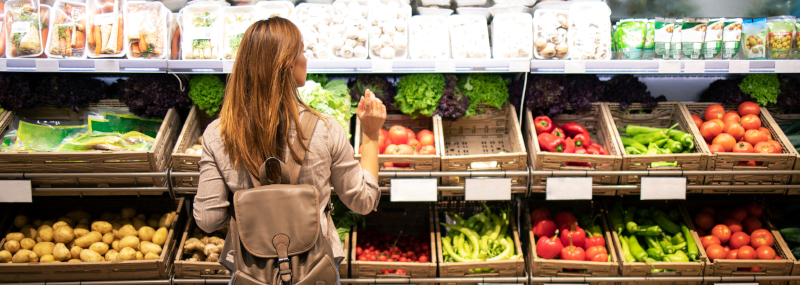Know the tricks
Grocery stores are designed to make you buy more than you plan—the store setup encourages quick decisions and impulse buys. Here are some of the most common tactics:
- Staples in the back: Bread, milk, eggs, and cheese are often displayed in a far corner in hopes that you'll put other items in your cart on your way to the essentials. The key is to stick to your grocery list and not let an enticing display (all the ingredients for s'mores—together!) convince you that you need something. Or you can start shopping from the back and go through the store in reverse. You may be less tempted to buy more when you've grabbed your must-haves first.
- Jumbo-size carts: Supermarket shopping carts tend to come in just 1 size: extra-large. That's so you have plenty of room to overbuy. (Alternatively, half-full carts give the illusion that you haven't picked up enough food or that you've forgotten something, pressuring you to buy more.) Whenever your shopping list is short, consider using a basket. It'll serve as a physical reminder of how much you're buying.
- Pricey items at eye level: Because these expensive items are right in front of your face, you may be more likely to grab them without a second thought. But it's wise to scan the shelves above and below your head. That's where the better deals tend to be.
Buy in bulk
If you have the storage space, bulk purchases of foods that don't spoil quickly and that you eat frequently can be a great way to save money in the long run. Individually portioned food, such as snack bags for taking on the go, come with an upcharge. Buying a single container with a large amount of food inside and doing the portioning yourself at home can cost much less.
Sodas, seltzers, and other drinks are typically cheaper in bulk too. If you have a habit of buying a single drink on your way to, from, or at work every day, consider buying in bulk at the grocery store and bringing your drink from home instead.
But heads up: Bigger doesn't always equal cheaper. Before you go bulk, do the math. Figure out the per-item or per-ounce cost for the bulk buy and compare it with the smaller version to ensure that the price really is right. One more thing to watch out for: Stores will often discount bulk items, tempting you to buy what you won't finish fast enough. If you won't finish something before it spoils, avoid buying it in the first place, no matter how much of a steal it seems to be.
Plan meals with what you have
Planning meals with ingredients you already have can help you reduce food (and money) waste because you'll be more likely to use up what's in your fridge or pantry. Think of the grocery store as a supplement to what you already have, or, better yet, aim for meals you can make without buying anything additional. Use an online recipe generator, which prompts you to enter the foods in your home, to get ideas. And don't stress if you're missing a spice or 2: Your dinner will probably taste just fine without that pinch of paprika.
Buy in season and locally
If a favorite fruit or vegetable isn't growing in your area when you want it, it might have to be shipped in from afar, which could raise the price. If you focus on local, in-season produce, this could potentially save you money and provide you with fresher food. If a recipe calls for something that's out of season, choose an alternative or head to the frozen aisle.
Get fruits and vegetables elsewhere
Supermarkets are convenient—everything you want to eat in 1 place—but convenience comes with a price. Consider venturing outside the grocery store for items you can get for less, such as produce. Vendors at farmers' markets often offer bulk discounts on their in-season produce.
Got a green thumb? Consider growing, freezing, canning, and preserving fruits and vegetables yourself. Tomatoes, cucumbers, strawberries, and garlic are easy to grow with cheap seeds in your own little garden. That can give you access to the tastiest ingredients at a fraction of grocery store prices.
Bottom line
Saving money on food might require some habit changes, but it doesn't require much sacrifice. Try these little tweaks to your routine to potentially save hundreds, if not thousands, of dollars each year.


